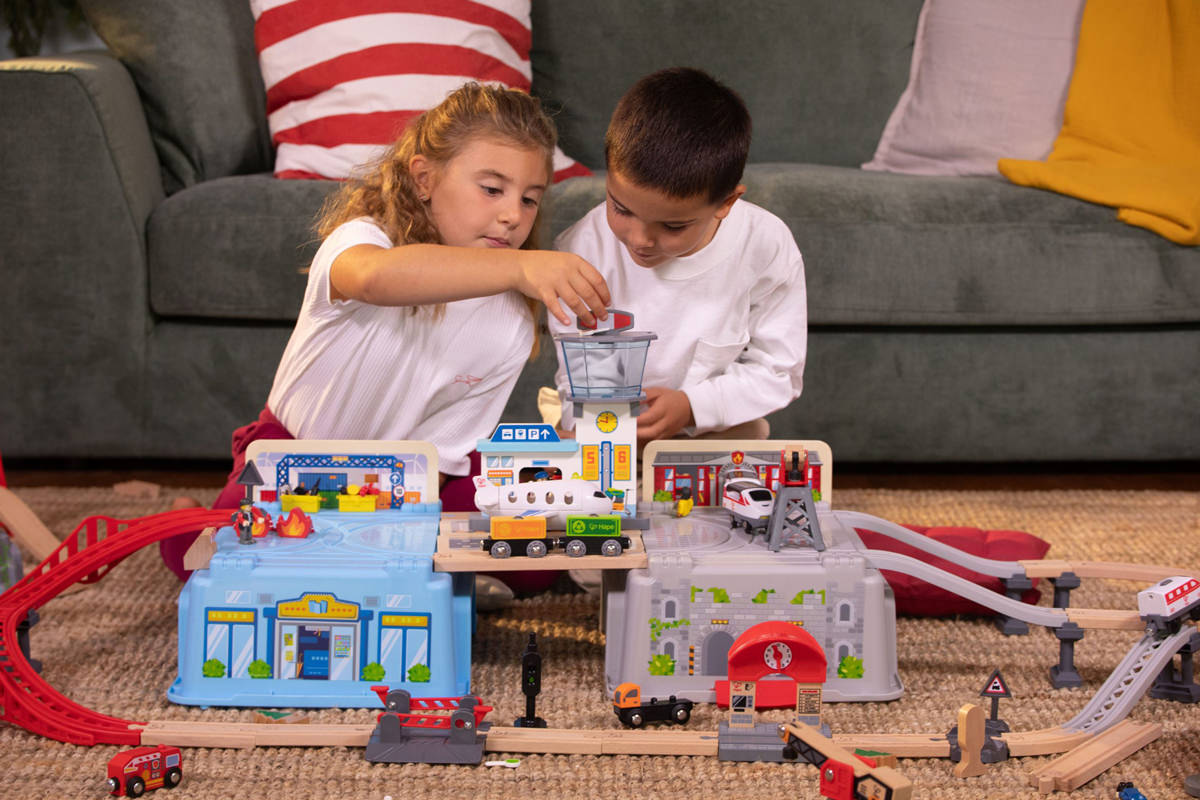30 October 2024
5 min.
Playtime is rarely the same; children become lost in their own imaginative worlds, creating tales and building adventures. Even though it might seem like “just play” to us, it's also the key to an intricate world of learning and growth for children.
Read on and discover how skills like language and socialising improve as they play.

From sharing toys to taking turns on swings, children learn key life skills through play. Waiting for a turn teaches patience, helping them develop the ability to manage emotions effectively and understand that good things come to those who wait. This also nurtures self-control, as they navigate their emotional state and the anticipation of their turn.
Playtime fosters communication skills and negotiation. Children often discuss sharing toys, asking, “Can I play after you?” or suggesting, “Shall we play together?” These social interactions teach them to express their needs while considering others’ points of view, highlighting the importance of compromise.
By practising these skills, children build the building blocks of social abilities, preparing them to navigate societal roles in the long term.
Conversations during play are essential for a child’s overall development, serving purposes that go far beyond improving language skills. Talking while engaging in play not only supports the growth of verbal abilities but also plays a key role in developing emotional intelligence. Emotional intelligence refers to the ability to recognise, understand, and manage one’s own emotions, as well as the emotions of others—an invaluable skill that children will carry into adulthood.
When children articulate their feelings during play, such as expressing frustration after losing a game or joy after succeeding, they are practising the crucial skill of emotional expression. This ability to communicate emotions effectively helps them navigate social interactions more smoothly and fosters stronger relationships with their peers. So, those conversations during playtime are helping children build essential emotional and social skills that will benefit them throughout their lives.
When children play with friends—whether long-time companions or new acquaintances—they embark on a journey that is both enjoyable and emotionally enriching. Play becomes a powerful setting where they not only master the mechanics of games but also develop the ability to understand and interpret emotions.
As they interact, children pay attention to a range of emotional expressions, such as the excitement on a friend’s face when scoring a goal or the frustration when a toy breaks. These moments are more than simple reactions; they are opportunities to enhance their emotional intelligence by recognising and processing different emotional states.
In responding to these emotions, children practice empathy and improve their communication skills. They might console a friend who’s upset or celebrate a peer’s success, reinforcing the importance of supportive social interactions. Such experiences strengthen their friendships and help them recognise the value of community and belonging.
When their own tower collapses or a game doesn’t go their way, children begin to manage their emotions effectively. These moments serve as key building blocks for developing high emotional intelligence, equipping them with essential skills for the long term.

Children’s seemingly boundless energy—whether they’re racing across the playground or showing off dance moves at home—serves a greater purpose than just play; it’s vital for their physical development.
As they run, jump, and climb, they build strength, improve coordination, and enhance balance. Every leap or sprint sharpens their motor skills and overall physical fitness. These activities also develop important communication skills like teamwork, while strengthening their ability to understand and respond to others, all of which are key building blocks for long-term growth.
Whether it’s building a toy tower or figuring out a jigsaw puzzle, playtime challenges present children with opportunities to enhance critical thinking and problem-solving skills. As they face these obstacles, children learn to understand cause and effect, developing their ability to analyse situations and devise solutions. Each successful action, whether balancing a block or finding the right puzzle piece, reinforces their understanding of how decisions impact outcomes, while improving motor skills and hand-eye coordination.
Additionally, playtime fosters emotional resilience. When their efforts don’t go as planned, children learn to manage their emotions effectively, cultivating a never-give-up attitude. This ability to manage setbacks builds patience and persistence, key components in developing high emotional intelligence. Through these experiences, play acts as a preparation for navigating life’s larger challenges, providing valuable lessons in both communication skills and emotional development.
Every time a child overcomes a challenge, no matter how minor, it strengthens their self-esteem and confidence. Whether it’s the proud smile they show after mastering a new game or the joy they feel when helping a friend, each accomplishment contributes to their growing sense of self-worth. These experiences are more than fleeting moments of success; they build the essential foundation of confidence that supports a child’s ability to face future challenges with assurance.
As children continue to achieve small victories, they develop an ability to understand their own strengths and weaknesses, instilling a belief in their capabilities. This growing sense of confidence not only enhances their communication skills but also plays a key role in their emotional development, encouraging resilience and a positive outlook towards overcoming obstacles. These moments of success contribute to a lasting belief in their abilities, which shapes their overall emotional well-being and social interactions.

Beyond the joy and mischief, playtime paves the path for future successes. Interactive play naturally fosters growth and understanding. By immersing themselves in joyful play, children, without realising, lay the foundation for their futures.